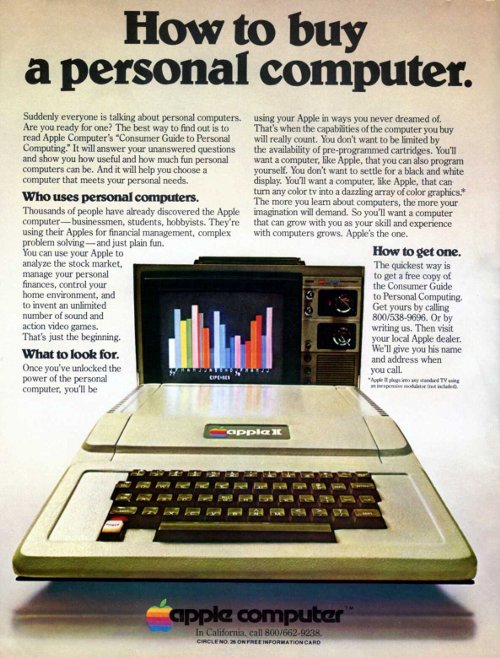This ingenious book by Douglas Adams has recently been added to the IB English approved reading list. It is a science-fiction novel, but it is also really funny. "Hitchhiker's Guide to the Galaxy" is the first book in a five-book trilogy (that's funny because trilogy means a series of three books.)
The amazing thing is that this book was published in 1979, but Douglas Adams must have been psychic or something, because The Hitchhiker's Guide to the Galaxy in the book is pretty much a Kindle or iPad.
To put things into perspective for you, this is what computers looked like in 1979: 

To learn more about this relic, click here.
Now read on and enjoy this excerpt from "Hitchhiker's Guide to the Galaxy:"
Ford handed the book to Arthur.
‘What is it?’ asked Arthur.
‘The Hitchhiker’s
Guide to the Galaxy. It’s a sort of
electronic book. It tells you everything
you need to know about anything. That’s
its job.’
Arthur turned it over nervously in his hands.
‘I like the cover,’ he said. ‘Don’t Panic. It’s the first helpful or intelligible thing anybody’s
said to me all day.’
‘I’ll show you how it works,’ said Ford. He snatched it from Arthur, who was still
holding it as if it was a two-week-dead lark, and pulled it out of its cover.
'You press this button here, you see, and the screen lights
up giving you the index.’
A screen, about three inches by four, lit up and characters
began to flicker across the surface.
‘You want to know about Vogons, so I enter that name so.’
His fingers tapped some more keys. ‘And
there we are.’
The words Vogon
Constructor Fleets flared in green across the screen.
Ford pressed a large red button at the bottom of the screen
and words began to undulate across it.
At the same time, the book began to speak the entry as well in a still,
quiet measured voice. This is what the
book said.
‘Vogon Constructor
Fleets. Here is what to do if you want to
get a lift from a Vogon: forget it. They
are one of the most unpleasant races in the Galaxy – not actually evil, but bad-tempered,
bureaucratic, officious and callous.
They wouldn’t lift a finger to save their own grandmother from the
Ravenous Bugblatter Beast of Traal without orders signed in triplicate, sent in, sent back, queried, lost, found, subjected to public inquiry, lost again, and
finally buried in soft peat for three months and recycled as firelighters.
‘The best way to get a
drink out of a Vogon is to stick you finger down his throat, and the best way to
irritate him is to feed his grandmother to the Ravenous Bugblatter Beast of
Traal.
‘On no account allow a
Vogon to read poetry at you.’
Arthur blinked at it.
‘What a strange book.
How did we get a lift, then?’
Simile - This compares the book to a dead bird. The bird has been dead for two weeks, so it is probably smelly and covered in maggots and flies by this point. Of course Arthur was not really holding a dead, maggoty bird. This simile shows the reader what kind of attitude Arthur was holding the book with. In this case, it would seem that he is not too thrilled to be holding this book. This also gives us some insight to Arthur's character -- he is a bit of a wimp.
Verbs - But not just any verbs. These verbs are each carefully selected by the author to give the reader a good mental image of what the subjects of the verbs are doing, and also to invoke feelings to set or alter the mood of the passage. "Flicker" tells the reader that the words are quickly flashing, and sets a technological mood. "Tapped" shows the reader that Ford is an adept typist on the electronic book; he has used it a lot. "Flared" is more ominous than "flicker," so it immediately warns the reader that they are going to find out some nasty things about the Vogons. "Undulate" is also a bit of a creepy way for words to move. It is something that worms or eels do.
Hyperbole - In other words, an exaggeration. Hyperbole is often used in comedic works because it is funny to exaggerate.
Repetition - The words "Ravenous Bugblatter Beast of Traal" are pretty funny, so you can see why Douglas Adams would want to repeat them. The repetition also ties this idea to the one before it, and is funny again because it reiterates to the reader just how bureaucratic the Vogons are, without going into the actual description again.
"Hitchhiker's Guide to the Galaxy" is not in the public domain yet, so you can't read it for free on Project Gutenberg. But it's freaking hilarious, so you should read it, and the other four books in the trilogy, too. You can buy them via his website: http://www.douglasadams.com/creations/hhgg.html
No comments:
Post a Comment